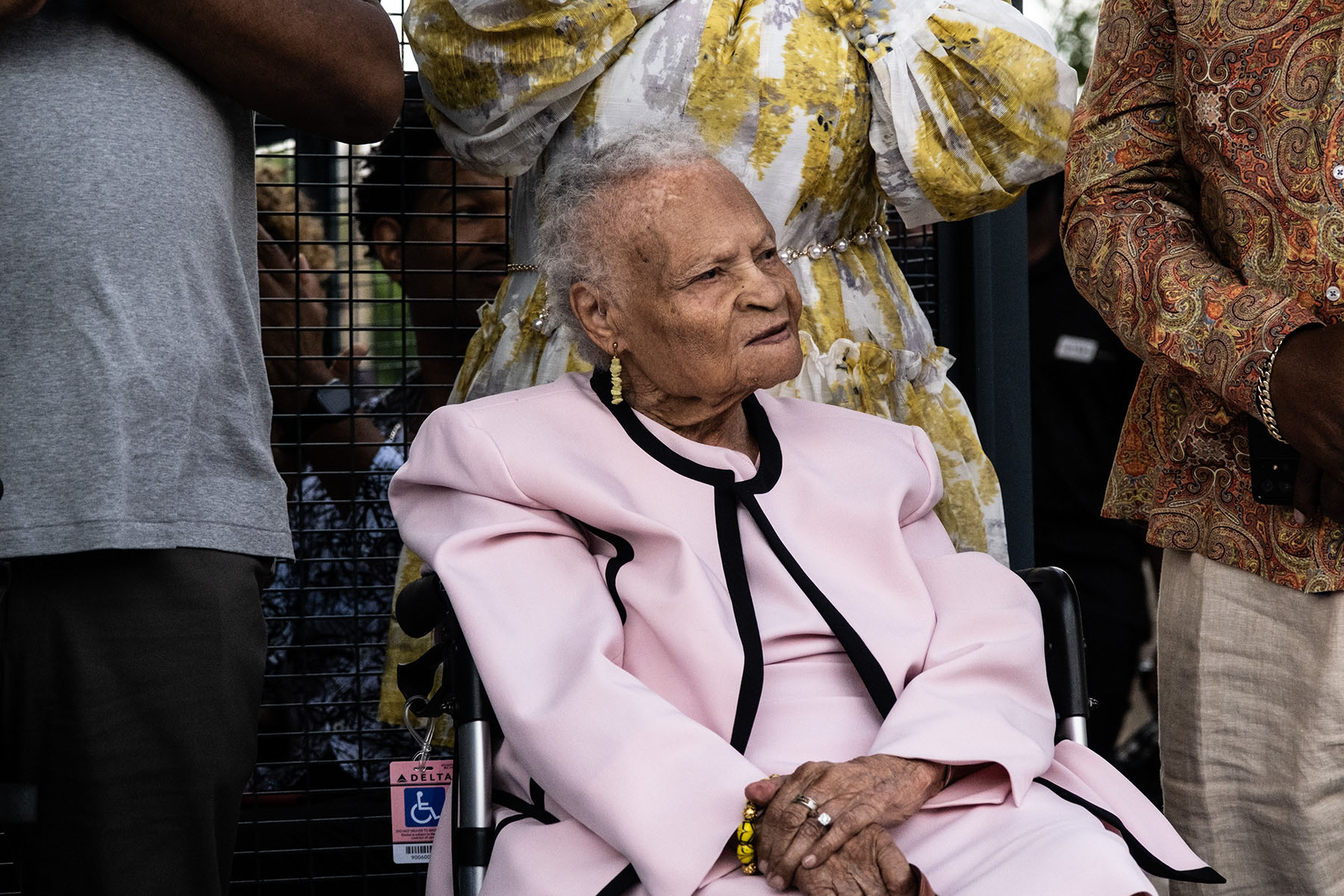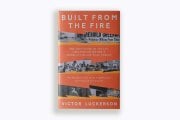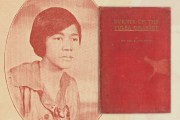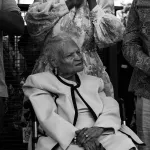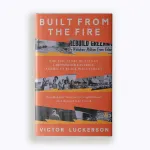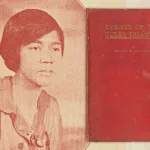More than 100 years later, Viola Fletcher can still vividly remember the smell of her thriving neighborhood — dubbed America’s “Black Wall Street” — burning.
Fletcher, now 109 years old, was just 7 when a White mob burned the Greenwood district of Tulsa, Oklahoma, to the ground. She is the oldest known living survivor of what has become known as the Tulsa massacre. Fire, smoke and the violence of the mob fashioned memories of the night of May 30, 1921, that even a century later Fletcher can still speak to with sobering clarity and strength.
“You know, I can still smell the smoke … the burning,” Fletcher told The 19th. “I remember the bodies. All the Black bodies in the street. The sound of the guns … they didn’t stop — I can still hear them.”
“I haven’t forgotten that. I can’t forget that … you can’t. It doesn’t go away.”
On July 4, Fletcher’s memoir, “Don’t Let Them Bury My Story,” published, making her the oldest woman in the world to write a memoir. The book lays bare the moments of the massacre, what happened after it finally ended and all the time since then that has comprised her life, which, even now, is still being impacted by the disaster.
Ike Howard, Fletcher’s grandson who co-wrote the book with her, approached publicist Margo Ochoa to shop the book to publishers, but they didn’t have any takers.
“I knew this had to get out there. That first conversation with Ike and the family, I knew. I knew that this was too important and powerful not to,” Ochoa said. “So when the doubts and flat out ‘no’s came in from publishers, I was floored.”
Ochoa then decided to publish the book herself, the first title by her newly formed Mocha Media company.
“I got into literary activism because of what I saw during my early years in media. So many Black stories are out there that could do so much, that deserve to be told,” Ochoa said. “I wasn’t going to stop.”
Her book’s original release date, May 30 — the day before the anniversary of the massacre — was pushed back after Fletcher and the other two remaining survivors made what many feel like was their last attempt at securing reparations for and acknowledgment of the devastation of the massacre.
The three survivors, supported by the Justice for Greenwood organization, filed a lawsuit in 2020 against defendants including the city of Tulsa, the Tulsa Board of Commissioners and the Oklahoma Military Department seeking restitution for impacts of the massacre. Despite multiple dismissals, the survivors refiled. Their latest attempt found itself again hanging in the balance when they were called into a hearing by Tulsa County District Judge Caroline Wall. The hearing fell on May 5, Fletcher’s 109th birthday, however celebrations were put on hold as the survivors found out Wall was delaying her ruling on the defendants’ motion to dismiss the case.
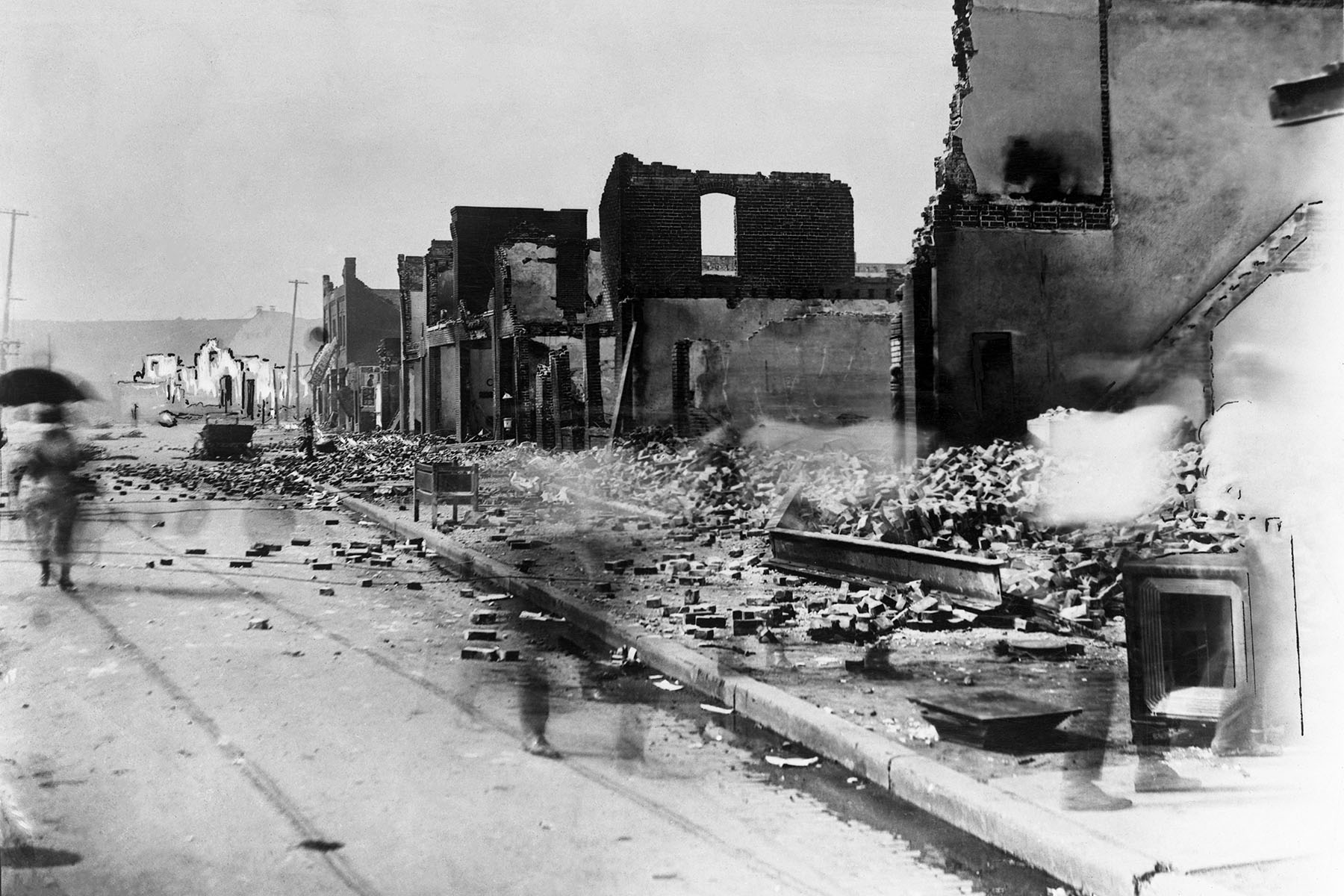
Two months later, on July 7, Wall dismissed the case, bringing the years-long effort to win compensation for the survivors, whose ages range from 102 to 109 years old, to an end. The case was dismissed with prejudice, meaning it can’t be refiled.
“I will not be dismissed. Our stories, our pain and our demand for justice cannot be erased or ignored,” Fletcher said in a statement following the ruling. “The dismissal of this case sends a chilling message that the crimes committed against our communities can be swept under the rug. Forgotten. Buried.”
“But we will not allow that to happen. We will continue to fight for truth, for justice, and for the acknowledgment of our suffering. They will not bury my story,” she said.
For now, survivors and supporters must depend on the city of Tulsa’s long-delayed and slow-moving effort toward recognition and healing.
As a sixth generation Tulsan, and third in his family to serve as mayor of the city, Mayor G.T. Bynum was no stranger to its history, except its complete one. Bynum, whose father was the president of the historical society, didn’t learn about the massacre until 2000. Bynum was in his mid-20s when he heard about it.
Since then, Bynum has been open about his regret. In 2021, he issued a statement acknowledging his commitment to back efforts to repair the chasm the massacre left in the community and apologizing for the city’s involvement.
-
Read Next:
“The city remains committed to finding the graves of 1921 Tulsa Race Massacre victims, fostering economic investment in the Greenwood District, educating future generations about the worst event in our community’s history, and building a city where every person has an equal opportunity for a great life,” Bynum said after the court’s decision to dismiss the case.
Despite his support for these efforts, Bynum also agreed with the court’s dismissal of the restitution case, saying he believes that the city is doing more to address racial disparities than at any point in his lifetime, “and I would expect, probably, in the history of the city.”
“My hope is that we as a community can work together more on these initiatives, whether that is to search for the graves or promoting education through institutions like Greenwood Rising or in schools,” he said.
The Tulsa massacre remains one of the most consequential events of state-sanctioned racial violence and domestic terrorism in America’s history. With the “Red Summer” happening just two years before, racial tensions throughout the country were at a high point of agitation, and Tulsa, on the whole, was no exception.
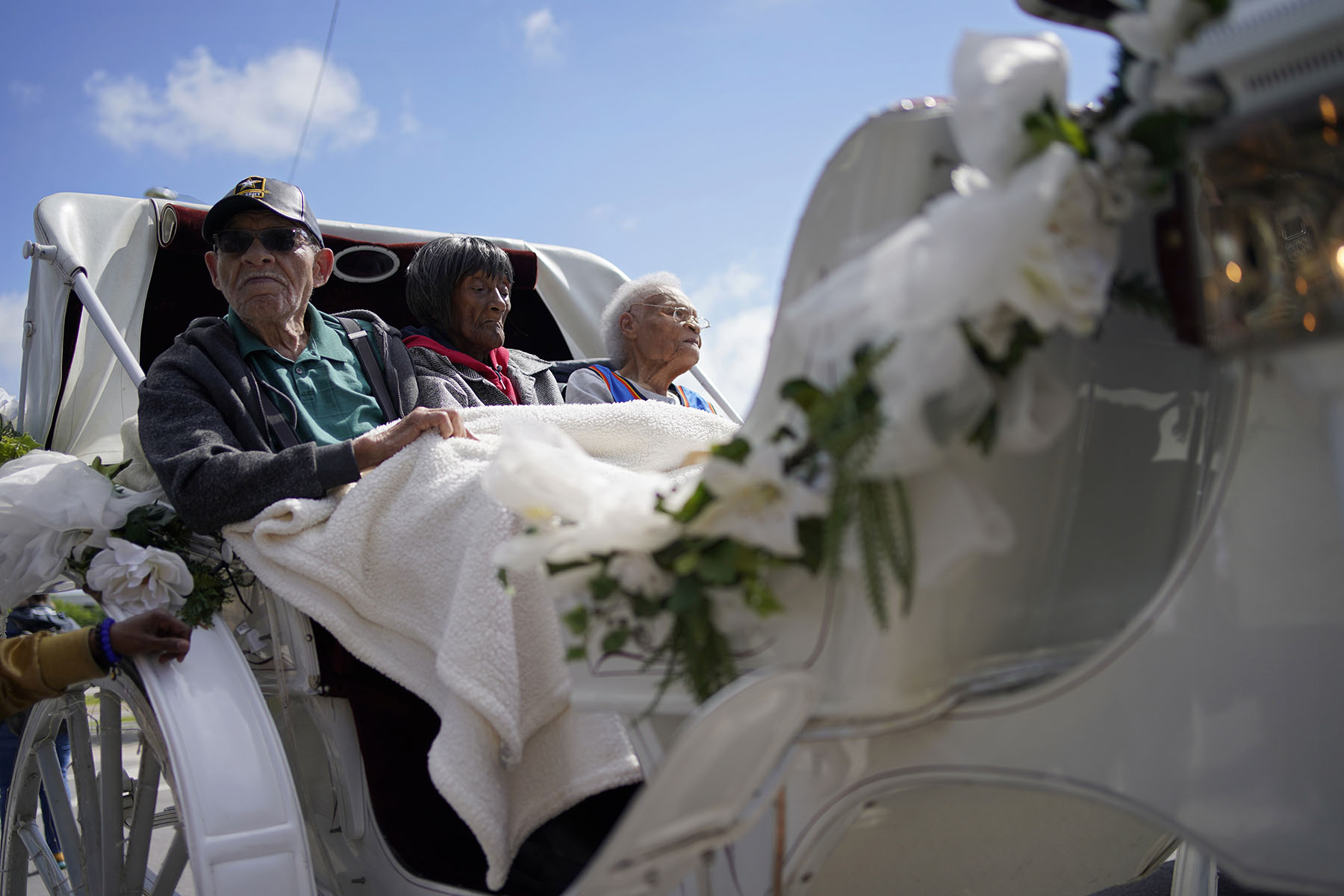
For its exceptional concentration — for the country at the time — of Black doctors, lawyers, teachers, business owners and social mobility available for Black people, after one visit Booker T. Washington named Greenwood’s 35 square miles of Black-owned businesses Black Wall Street.
On May 30, 1921, a 19-year-old Black boy named Dick Rowland was wrongly accused of sexually assaulting a 17-year-old White girl by the name of Sarah Page in an elevator.
After the White-owned Tulsa Tribune newspaper ran a headline that read, “Nab Negro for Attacking Girl in Elevator,” a mob of White Tulsans in the thousands incensed by the news stood outside of the jail where Rowland was being held and called for his life.
From May 31 to June 1, the mob, hundreds of whom had been deputized and armed by local law enforcement, descended on Greenwood, pillaging, massacring and burning Black Wall Street to its foundations.
In their wake, an estimated 300 Black people were slain, with thousands more displaced. Along with pillars of the community like churches, businesses and schools, at least 1,256 homes were destroyed, leaving what would be $27 million today in uncompensated damages.
In 2021, just days ahead of the centennial anniversary, the last three known living survivors — Fletcher, her brother, Hughes Van Ellis, and Lessie Randle — testified before Congress, recounting the horrors, their impacts and making the case for acknowledgement and reparations for the survivors and their descendants.
Fletcher, known affectionately by her community and family as “Mother Fletcher,” might have only been 7 years old the night the attack on Greenwood began, but so devastating were the horrors that prevailed over those 18 hours that the memories remain.
Awakened by her parents in the middle of the night with an urgency that allowed for nothing more than obedience, Fletcher grabbed her then 2-year-old brother and followed her parents and siblings as they fled the attack.
In modern-day Tulsa, the Black Wall Street Legacy Festival is a month-long celebration of the survivors, the spirit and future of Greenwood, hosted by the community and partners who support the mission of “spreading truth, inspiring hope, and extending tradition.”
This year’s Legacy week, the last week of May, Fletcher sat center stage at Fulton Street Bookstore surrounded by her grandson, Howard, her brother and a packed room of Greenwood residents and extended community. Fletcher spoke about her book, what fueled her lifetime of work seeking justice and what remembering meant to her and should mean to them.
Howard, who’d been raised by Fletcher, respectfully never asked but always wondered about certain things about his grandmother: Why did she sleep sitting up? Why did she avoid sleeping in beds? It wouldn’t be until he got older and took over her care that he would learn of the massacre, his grandmother’s story and finally get his answers.
“They didn’t tell anyone because they had to protect themselves and their families — us, and I understand that. It takes strength to do that. Now, it’s not the same time anymore. We’re here,” Howard said, gesturing to his cousins and extended Greenwood community. “The trauma and violence from the riots did not stop that night. It’s still happening. We’re here to make sure people know their stories. To get some kind of justice. That’s why we’re here. That’s why this book and her story is important — for all of us to not just know, but remember.”
